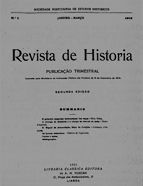

................................
“Later, the fashion turned to the ideas of this group, with all the exaggerations of something delayed; and the simple consideration of the historical spirit became an overtly traditionalist reaction. By then, the group of scholars had dissolved, as their position was precarious and unstable in the face of the violence of events” ( História Literária de Portugal ( Séculos XII–XX) [Literary history of Portugal (12th-20th centuries)], pp. 435–445).
It can be assumed that Fidelino was referring to the moments preceding and subsequently supporting some of the foundations of the Estado Novo. The defence of tradition by the SPEH, one of its cornerstones, has already been mentioned here, but this advocacy was not aimed at a regressive, reactionary, or backward-looking action. Always bearing in mind the idea of progress, the concept of tradition here embraced a particular attention to historical heritage and its moderating role in avoiding overly abrupt disruptions in the present. It was not, therefore, the backward-looking traditionalism of the Lusitanian Integralism nor, obviously, that of the Estado Novo . Despite an ideological component evident in SPEH’s actions, these activities or criticisms were always grounded in scientific principles – for example, Fidelino would later issue a harsh critique of a work by Hipólito Raposo, a prominent member of the Integralism movement ( Revista de História , vol. 5, pp. 85-86). Nonetheless, this did not prevent Fidelino from revealing, in his thinking, certain points of contact with the Integralism movement. Let us now review the sphere of its associates.
.
Based on the available data, by 1920, the SPEH had gathered 127 members, accounting for both departures and admissions (refer to the complete list in A SPEH no contexto historiográfico nacional , Annex 2, pp. 113-121). This number may have been significantly higher. The admission of new members occurred consistently but with relative irregularity. Apart from 1916, the number of members consistently displayed an upward trend. In the initial years, a notable influx of members was recorded, particularly in 1913, with numbers stabilising until 1919-1920, when a significant peak in new admissions occurred (in 1920, for example, 20 new members joined ) . The exact reason for this sudden increase remains unknown, though it is hypothesised that Fidelino de Figueiredo’s appointment as director of the National Library of Lisbon in 1918 may have contributed to raising the SPEH's profile.
This work is financed by national funds through FCT - Foundation for Science and Technology, I.P, in the scope of the projects UIDB/04311/2020 and UIDP/04311/2020.
